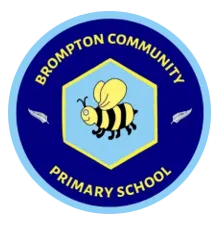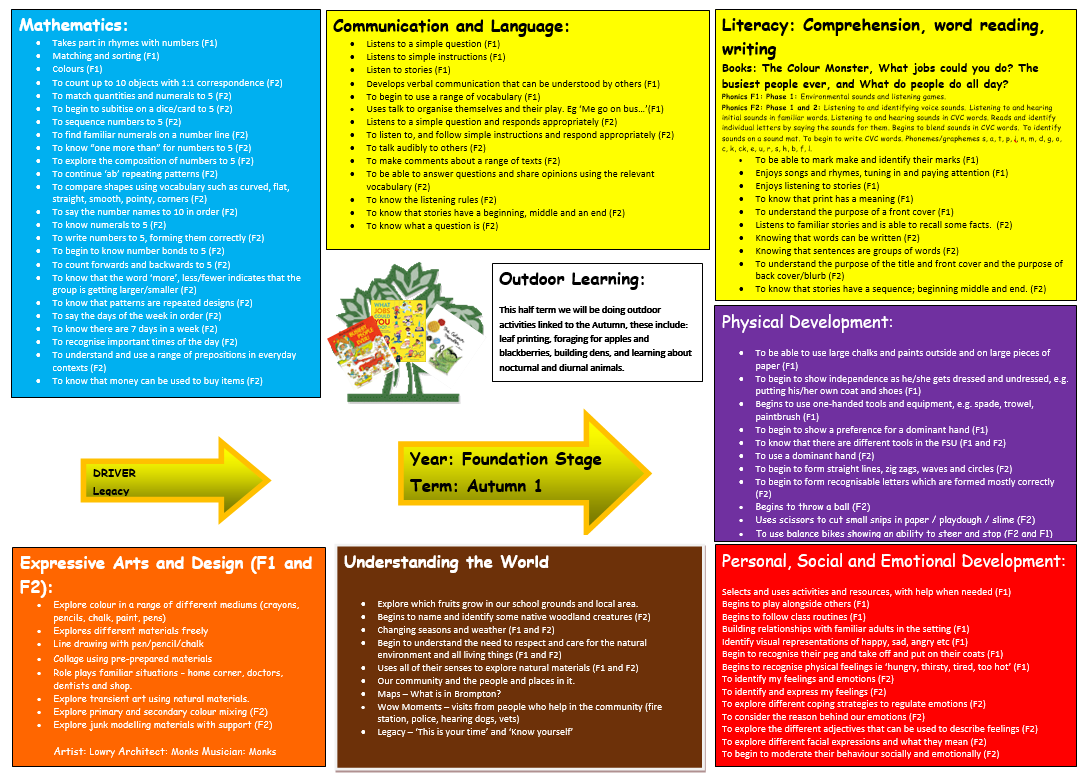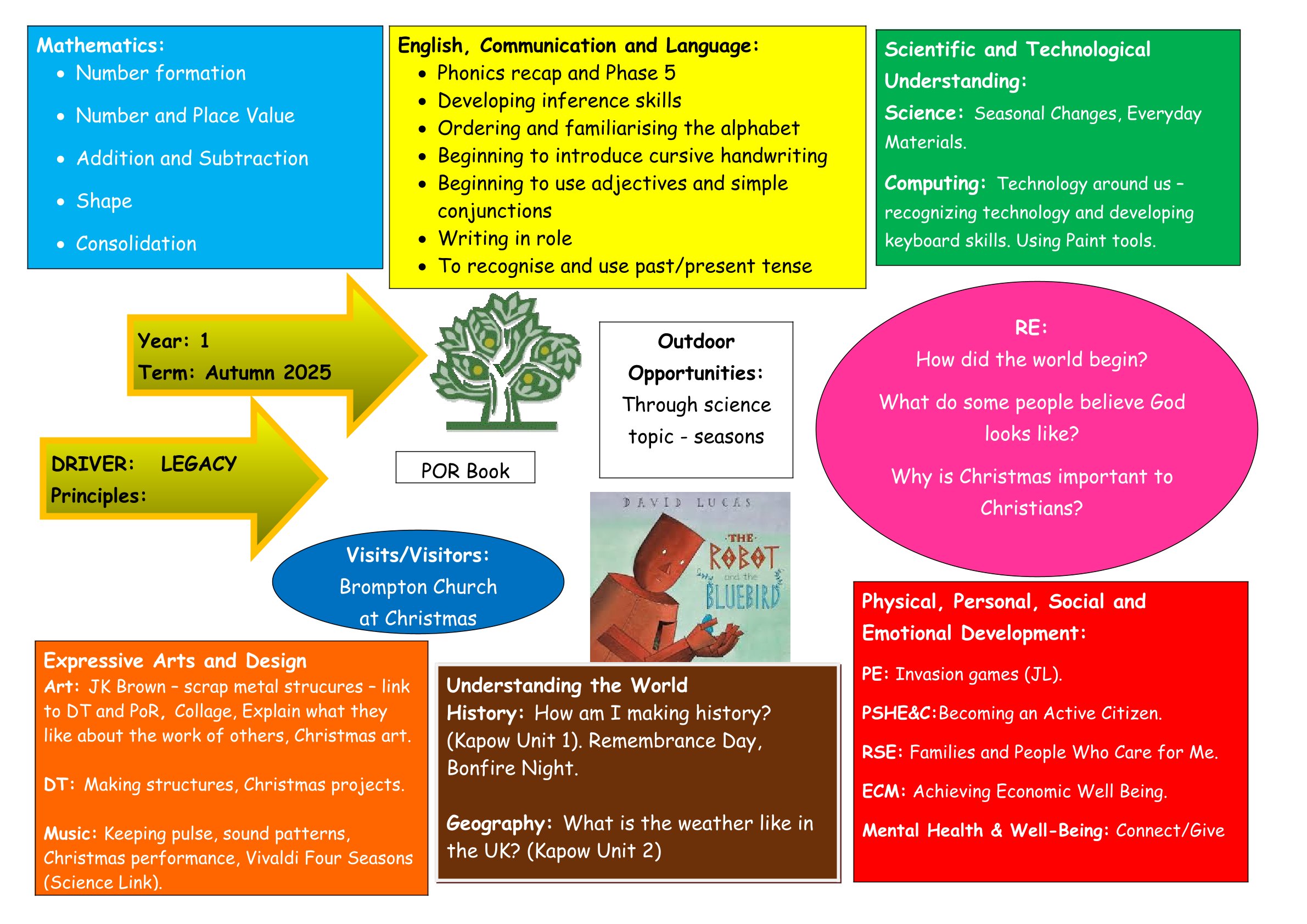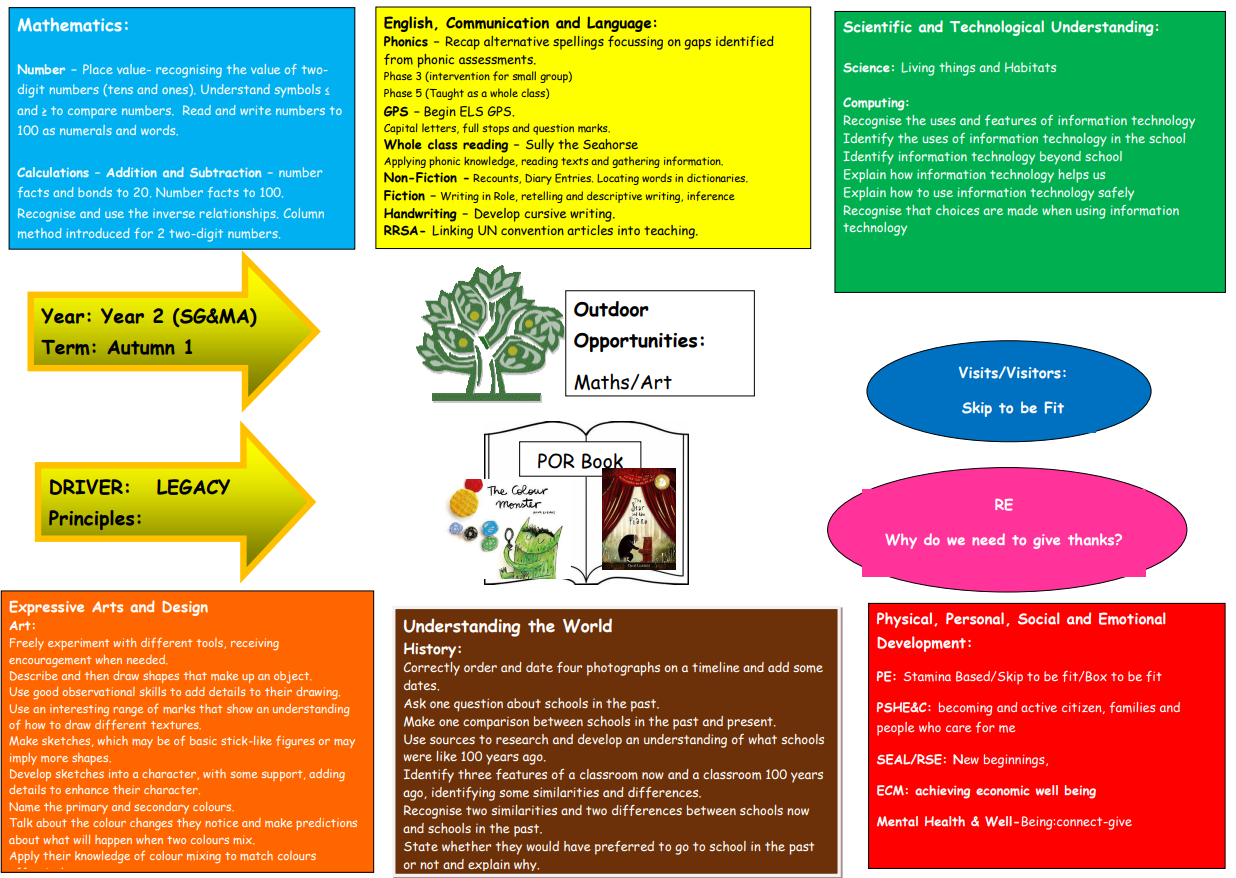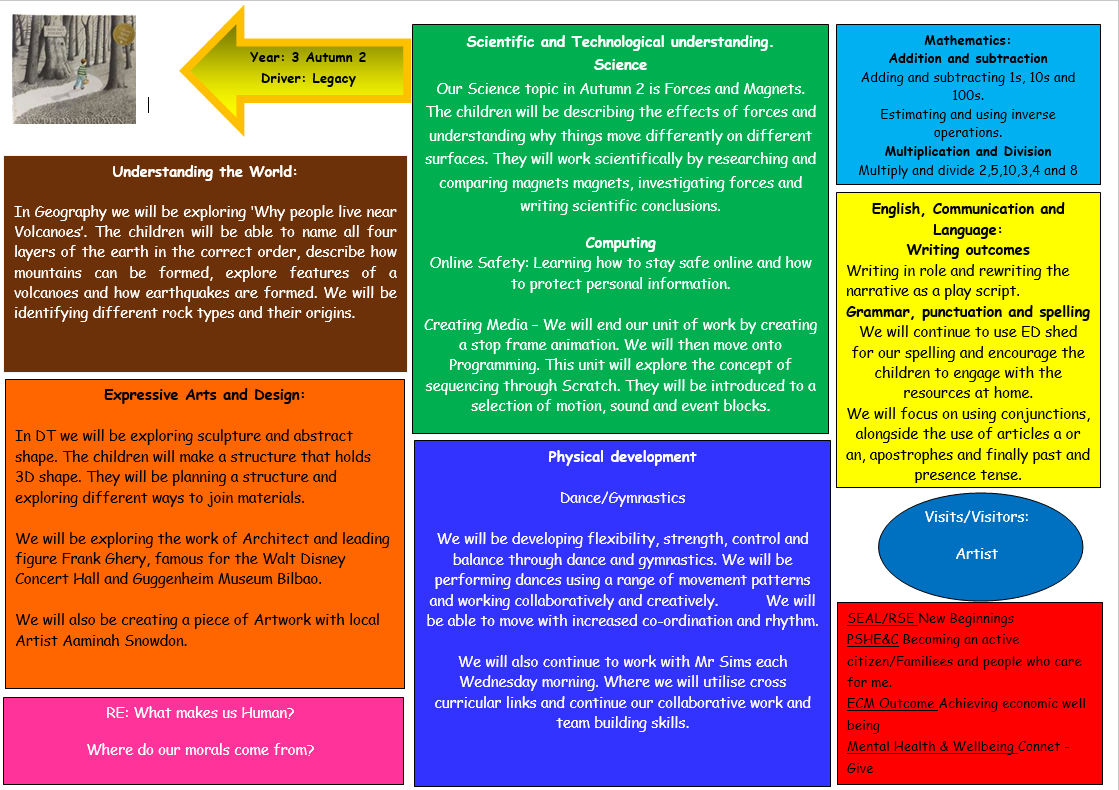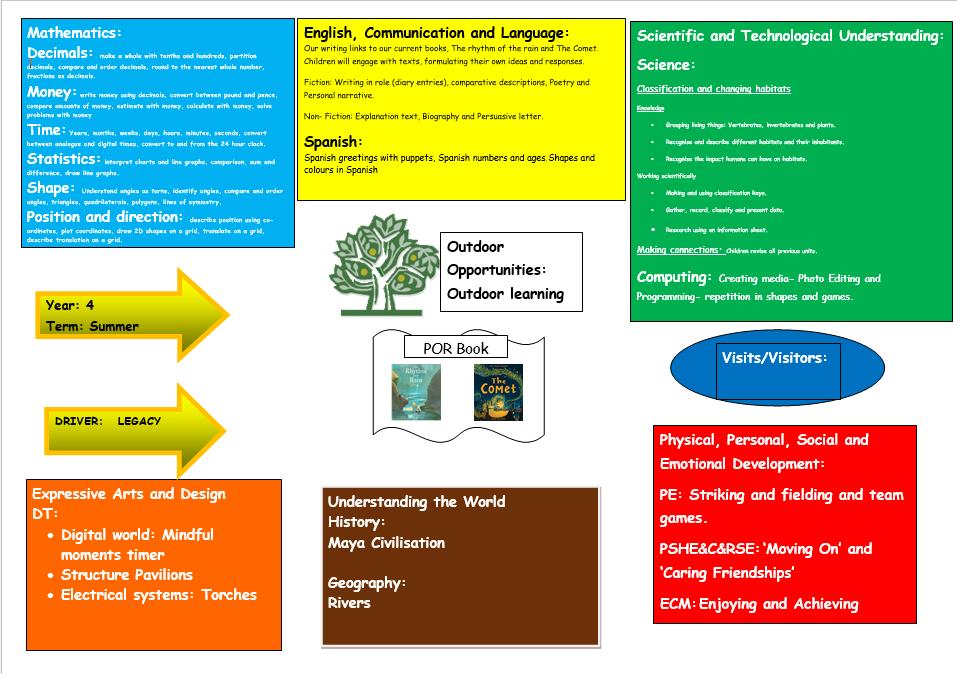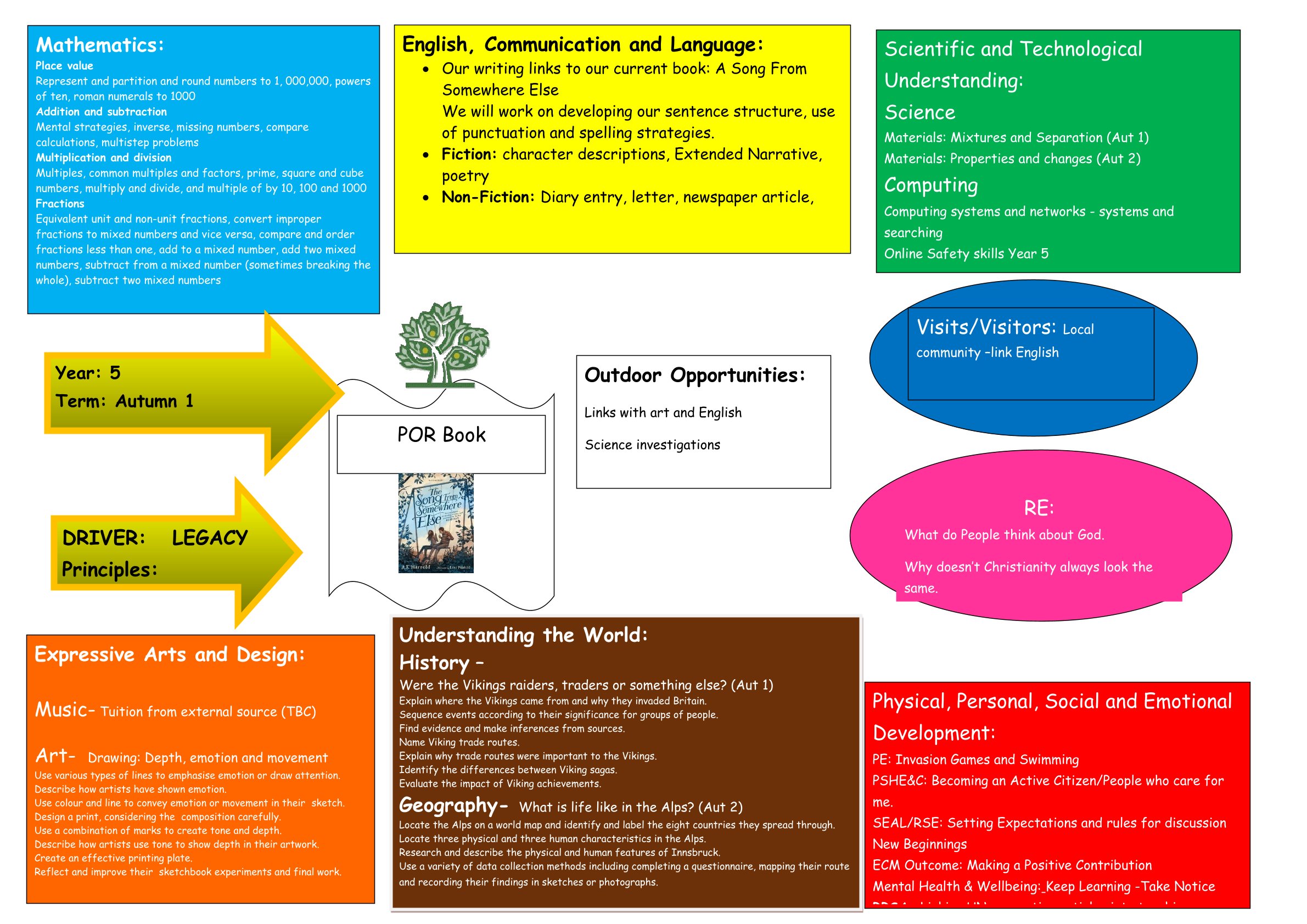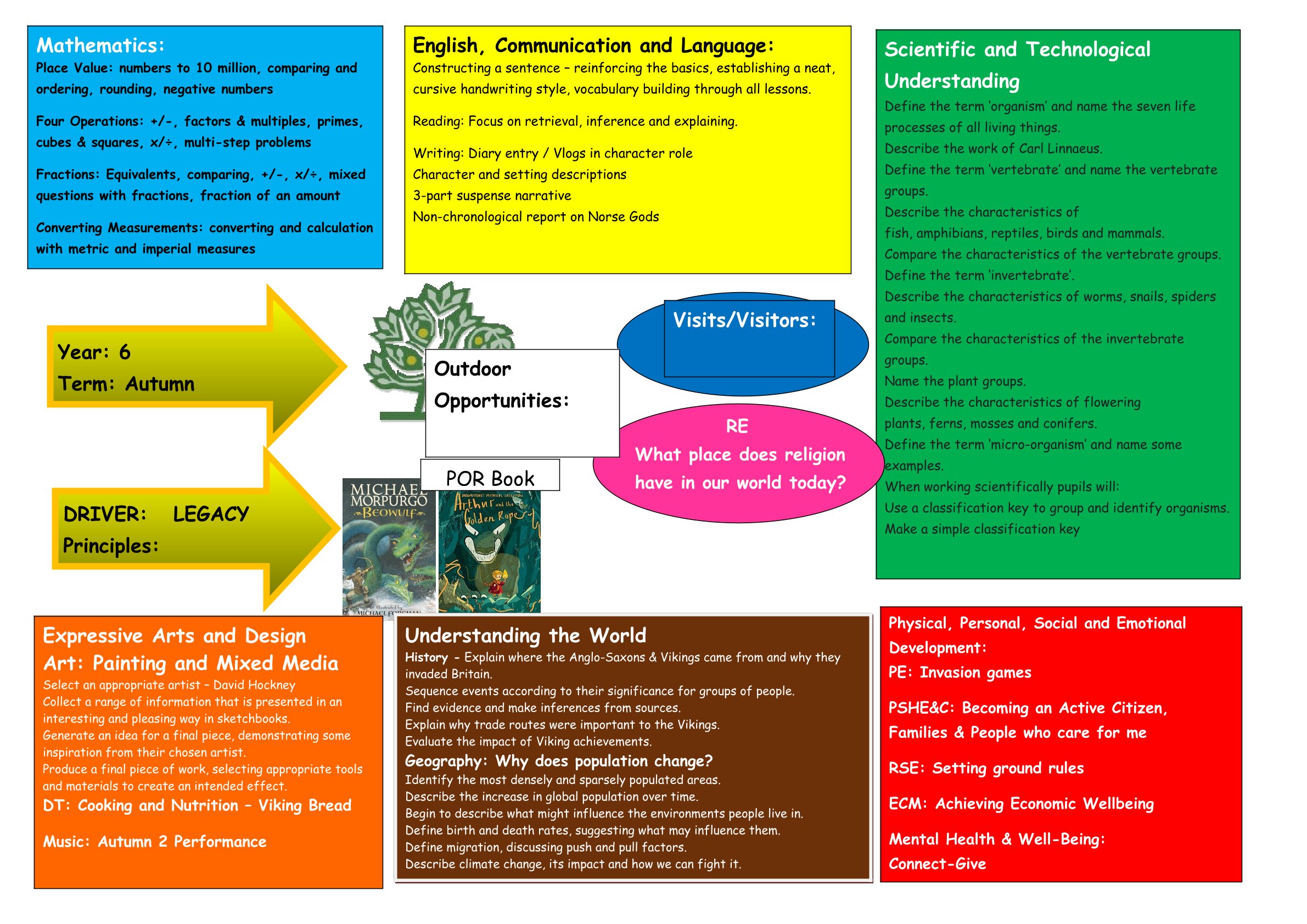Brompton Community Primary School
Big Picture Planning - Summer Term
Foundation Stage Big Picture Plan
Year 1 Big Picture Plan
Year 2 Big Picture Plan
Year 3 Big Picture Plan
Year 4 Big Picture Plan
Year 5 Big Picture Plan
Year 6 Big Picture Plan
Stay Grounded; Constantly Strive to Improve; Understand the Shared Goals; Take Responsibility;
Create a Learning Environment; Have the Right Character; Embrace Expectations;
Keep Practising Even Under Pressure;
‘Our Curriculum for Our Children’
Curriculum Intent: We need to consider the extent to which our curriculum sets out the knowledge and skills that our pupils will gain at each stage.
We need to consider the way that our curriculum is taught and assessed in order to support pupils to build their knowledge and to apply that knowledge and skills (implementation).
We also need to consider the outcomes that pupils achieve as a result (impact).
At Brompton Community Primary School, we provide a deep and rich curriculum that is committed to ensuring pupils learn key knowledge and concepts for all subjects in greater depth. We promote an ambitious curriculum that provides opportunities for our pupils that inspires them to aim high and strive to improve and enquire.
We use our ‘Legacy’ principles to promote positive attitudes to learning which reflect the values and skills needed to promote responsibility for learning and future success.
Our planning provides an outline of core knowledge where teachers develop exciting and stimulating lessons in order to promote the development of pupils’ knowledge, skills and understanding. We enhance subject teaching with planned cross curricula themes and topics. English and Maths skills are highlighted in all areas of the children’s learning and remain a focus within all subject areas. We provide pupils with memorable experiences, in addition to diverse and rich opportunities from which the children can learn and develop a range of transferable skills. Our curriculum threads SMSC (Spiritual, Moral, Social and Cultural) across all subject areas and school life and ensures pupils are aware of the history and values of Britain and prepares pupils for life in modern Britain. We teach children how to keep safe and promote pupil well-being; this is supported by assemblies and teaching through PSHE & C (Personal, Social, Health Education and Citizenship). There is high expectation for all groups of pupils with challenging learning for all. High quality AFL (Assessment for Learning) is used to personalise learning for all groups of learners, maximising their rates of progress. Pupils are encouraged to learn from mistakes, developing resilience and good learning behaviours. The curriculum is designed to: recognise children’s prior learning, provide first hand learning experiences, allow the children to develop interpersonal skills, build resilience and become creative, critical thinkers.
Every child is recognised as a unique individual. We are Gold Award holders for RRSA and we promote the UN convention for children’s rights, we celebrate and welcome differences within our school community. The ability to learn is underpinned by the teaching of basic skills, knowledge, concepts and values. We are constantly striving to improve and provide enhancement opportunities to engage learning and believe that childhood should be a happy, investigative and enquiring time in our lives where there are no limits to curiosity and there is a thirst for new experiences and knowledge.
Community involvement is an essential part of our curriculum as we celebrate local traditions, learning new skills to enable the children to take an active role in events throughout the year.
Children leave school with a sense of belonging to a tightly knit community where they have the confidence and skills to make decisions, self-evaluate, make connections and become lifelong learners.
Curriculum Implementation:
Brompton Community Primary School engages all learning styles using a variety of resources including Early Years Outcomes, National Curriculum Statutory Guidance, Skills based learning, A Challenging Curriculum, Outdoor Learning and enhancement opportunities which support teaching of the curriculum.
The curriculum framework is translated over time into a structure and narrative within meaningful context. We recognise and use clear, focused learning intentions and success criteria as an effective tool in gaining intended learning outcomes. Learning can be defined as an alteration in long-term memory. If nothing has altered in long-term memory, nothing has been learned. However, transfer to long-term memory depends on the rich processes described above.
In order to develop understanding, pupils connect new knowledge with existing knowledge. Pupils also need to develop fluency and unconsciously apply their knowledge as skills. This must not be reduced to, or confused with, simply memorising facts. We need to be alert to unnecessary or excessive attempts to simply prompt pupils to learn glossaries or long lists of disconnected facts. Through ‘Blooms’ vocabulary we use effective questioning techniques to develop higher order thinking skills and promote technical vocabulary through our ‘Wonder Words’.. In lessons we provide opportunities for study, but we strive to provide as many recall and application activities as possible to support the retention of knowledge and understanding.
Subject Leads:
Our subject leads oversee, develop, monitor and evaluate the effectiveness of their subject within school across all year groups and phases. Staff are committed to delivering high quality learning experiences throughout the curriculum. Support staff have developed their strengths in order to further enhance the quality of learning. We encourage self-reflection to enable children to see the impact of their understanding and progress within the curriculum and throughout school.
Maths:
In our maths curriculum, children are taught to be fluent and to apply skills to problems which help them to develop reasoning skills. These skills are transferable to everyday situations where maths is seen as an integral part of life.
English:
Reading is a fundamental part of everything we do at Brompton Community Primary School. Children are exposed to high quality texts across the curriculum and reading skills are taught explicitly in all year groups. Alongside the skills of decoding and comprehension, our Literature Circles and Power of Reading topics encourage children to think as a reader and discuss their preferences, likes and dislikes. Reading for pleasure is a cornerstone of our approach, with a well-stocked and well organised school library which children access both within the timetable and in their own time. The high profile of reading in school is further enhanced by the weekly Reading Trophy in each class. We have adopted ‘Whole Class Reading’ which enables all children to access a range of genres and texts.
Writing is taught through a range of exciting stimuli which includes books, film clips, artefacts, visitors and real-life experiences. We strive to equip children to develop a rich vocabulary which can help them bring their writing to life. Basic skills and non-negotiables underpin writing in all areas of the curriculum. Teachers model the writing process and demonstrate the ambitious high standards expected of all children. Every child is encouraged to let their imagination and personality shine through in their writing and writing is celebrated with a ‘Writer of the Week’ award. We promote a love of words and higher order language, and we use the ‘Wonder Word’ box to ensure that each child leaves each school day knowing more words than when they came.
Science and the Foundation Subjects:
We use our children’s love of questioning and deep-thinking skills to create an enquiry lead curriculum. Learning across science, history and geography is framed with questions that the children seek to answer. Children support the formulation of these questions through the planning process and creative thinking is developed through independence. Time for learners to reflect or review their learning is central to the whole process. We work closely with STEM and celebrate science week and have a weekly Super Scientist award.
In formulating Brompton Community Primary School’s response to the National Curriculum, we took into account our key learning priorities.
- Engaging learners in an exciting, challenging and creative approach to learning indoors and outdoors
- Application of Maths and English skills to continually raise standards and ensure progress
- Making links with the community around us through enterprise and collaborative learning events
- Working creatively with the Foundation subjects within the curriculum
- Learning from the world around us (though regular educational visits and visitors)
- Flexibility of delivery, to ensure identified gaps are closed and children’s learning styles are developed.
Learning challenges are carefully pitched to ensure children access work at age-related expectations, with regular and sustained challenge through higher level objectives. Basic skills are an integral part of this and are developed as a consequence. We aim to ensure children work at their age-related expectations and encourage and support children to exceed their own expectations through challenge. All learning challenges are linked to English and Maths work and subject specific skills are highlighted and applied throughout all subjects in the curriculum.
RE
Using the North Yorkshire Agreed RE Syllabus and SACRE children are taught knowledge and understanding around a range of religious and worldwide views. We educate all pupils about our diverse multi-cultural society and promote the societal ‘Everybody’s Invited ‘agenda so that they can: describe, explain, analyse and investigate allowing them to appreciate beliefs and practices, recognising the diversity, meanings and values within and between communities (including their own) and amongst individuals.
Computing
Our computing curriculum is designed to equip children with the skills and understanding to live in a technological world, this includes being able to use a variety of computer software and coding programmes. There is an emphasis on the importance of Online Safety for all year groups.
Outdoor Learning
At Brompton Community Primary we believe that classrooms do not necessarily need walls and teachers regularly take children and their learning outside the classroom to make learning more relevant to their lives in the community and wider world. We encourage children to be responsible for and respect the local community and environment giving them a sense of belonging and ownership of the place in which they live by taking part in regular whole school litter picks. We explore the uses of the local area, integrating subjects so that meaningful activities can be planned and delivered effectively and regularly. We consider lunchtime to be an extension of the curriculum. Structured play opportunities are provided, and children are encouraged to think creatively, apply their understanding in individual ways to be able to draw upon their own experiences and to be imaginative during play.
Visits and Visitors
In the curriculum we recognise that children’s learning is enhanced by different experiences. We offer children a wide range of educational visits which are used to motivate and engage learning which improves retention. For example, the whole school visited the Abbey that their school House team is named after.
Regular visitors in school give the children another perspective on values, attitudes, learning and understanding. These include charities, people from different professions and the community.
Please refer to curriculum enhancements.
Curriculum Impact
The impact of the curriculum at Brompton Community Primary School creates a culture of high aspiration for our pupils. The secure subject knowledge of our teachers and teaching assistants ensures effective questioning that checks pupils’ understanding and encourages them to be independent learners. A rich, diet of activities and opportunities enrich pupils’ experiences across the curriculum providing many memorable learning outcomes. All subject areas will contribute to the development of the whole child emotionally, aesthetically, spiritually, intellectually and socially.
At Brompton Community Primary School the key purpose of assessment is to move children on in their learning. Continuous monitoring of each child’s progress gives a clear picture of what each child is doing. It is important that the teacher knows what has been remembered, what skills have been acquired and what concepts have been understood. This enables teachers to reflect on what children are doing and informs their future planning. The outcomes of our assessments will help children become involved in raising their own expectations, celebrating their own achievement and increasing their self-motivation, then learners are directly responsible for their own attainment and therefore must take charges of their own learning. Our assessments also provide information for others including:
- Parents and pupils- to show progress and areas for development and involve them in the learning process
- Other teachers- to help them plan and gain informed views
- Outside agencies- to provide evidence of attainment
Brompton Community Primary School uses Assessment for Learning as a tool for continual improvement by:
Sharing learning objectives with pupils
- Share learning objectives and outcomes at the beginning of the lesson and, where appropriate, during the lesson in language that pupils can understand using ‘Bloom’s Vocabulary’.
- Use these objectives as the basis for questioning and feedback during a lesson eg. ask pupils to explain what they are trying to learn and why
- Evaluate this feedback in relation to achievement of the learning objectives to inform the next stages of planning.
Curriculum Intent: We need to consider the extent to which our curriculum sets out the knowledge and skills that our pupils will gain at each stage.
We need to consider the way that our curriculum is taught and assessed in order to support pupils to build their knowledge and to apply that knowledge and skills (implementation).
We also need to consider the outcomes that pupils achieve as a result (impact).
At Brompton Community Primary School, we provide a deep and rich curriculum that is committed to ensuring pupils learn key knowledge and concepts for all subjects in greater depth. We promote an ambitious curriculum that provides opportunities for our pupils that inspires them to aim high strive to improve and enquire. We use ‘Legacy’ to promote positive attitudes to learning which reflect the values and skills needed to promote responsibility for learning and future success.
Our planning provides an outline of core knowledge where teachers develop exciting and stimulating lessons in order to promote the development of pupils’ knowledge and understanding. We enhance subject teaching with planned cross curricula themes and topics. English and Maths skills are highlighted in all areas of the children’s learning and remain a focus within all subject areas. We provide pupils with memorable experiences, in addition to diverse and rich opportunities from which the children can learn and develop a range of transferable skills.
Our curriculum threads SMSC (Spiritual, Moral, Social and Cultural) across all subject areas and school life and ensures pupils are aware of the history and values of Britain and prepares pupils for life in modern Britain. We teach children how to keep safe and promote pupil well-being; this includes assemblies and teaching through PSHE & C (Personal, Social, Health Education and Citizenship). There is high expectation for all groups of pupils with challenging learning for all. High quality AFL (Assessment for Learning) is used to personalise learning for all groups of learners, maximising their rates of progress. Pupils are encouraged to learn from mistakes, developing resilience and good learning behaviours. The curriculum is designed to: recognise children’s prior learning, provide first hand learning experiences, allow the children to develop interpersonal skills, build resilience and become creative, critical thinkers.
Every child is recognised as a unique individual. We are Gold Award holders for RRSA and we promote the UN convention for children’s rights, we celebrate and welcome differences within our school community. The ability to learn is underpinned by the teaching of basic skills, knowledge, concepts and values. We constantly provide enhancement opportunities to engage learning and believe that childhood should be a happy, investigative and enquiring time in our lives where there are no limits to curiosity and there is a thirst for new experiences and
knowledge.
Community involvement is an essential part of our curriculum as we celebrate local traditions, learning new skills to enable the children to take an active role in events throughout the year. Children leave school with a sense of belonging to a tightly knit community where they have the confidence and skills to make decisions, self-evaluate, make connections and become lifelong learners.
